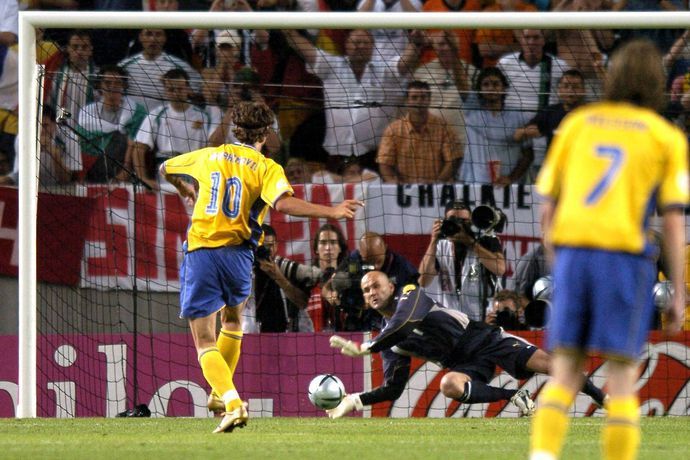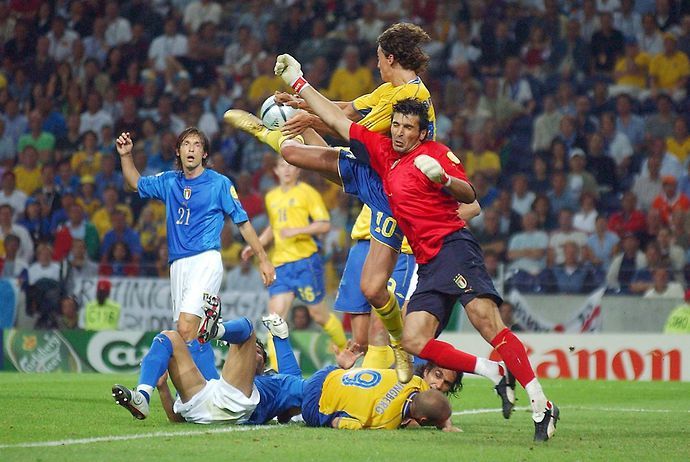It seems hard to believe now, but there was a time in football when Zlatan Ibrahimovic was known, but not quite to his modern-day levels of egocentric grandeur.
In the summer of 2004, Ibrahimovic was still viewed as a somewhat bright ‘prospect’; an up-and-comer with massive potential. The Swede was still at Ajax, and had produced a good season going into Euro 2004, scoring 13 goals in the Eredivise.
Ibrahimovic’s goals had secured a second league title in three seasons, but Ajax’s disappointing performances in that season’s Champions League did little to bolster his reputation outside of Holland.
One goal, in one game, would forever change that, however.
Ibrahimovic was part of a decent Sweden side that went to the tournament under the delightfully named coach Lars Lagerback. The squad was a fine mix of older veterans, such as Henrik Larsson, Johan Mjällby and Teddy Lucic, and young talents, like Freddie Ljungberg, Kim Kallstrom and Christian Wilhelmsson.
Sweden were drawn in Group C, which contained Italy, Bulgaria and Scandanavian neighbours Denmark. They got off to a blistering start, as they demolished the Bulgarians 5-0 in Lisbon. Ibrahimovic scored the fourth, a penalty, as he tormented the beleaguered Bulgarian defence for 90 minutes.
Their next game was against Italy at the Estadio Dragao in Porto, and it was here that the 22-year-old’s reputation soared.
Italy, like in most tournaments, had gone into the competition as one of the favourites, but under the ultra-conservative Giovanni Trapattoni, they’d struggled. Their opening game of the group against Denmark remains one of the worst games in recent European Championship history, a dour 0-0 draw only remembered for the large amount of phlem Francesco Totti directed towards the back of Christian Poulsen’s head.
Totti was banned for three games retrospectively, and so Italy went into the Sweden game with Antonio Cassano replacing Totti as the No.10.
Ironically, this was Italy’s best game of the tournament, with Trapattoni’s side playing some enterprising football, especially in the first half. They dominated the Swedes, and Cassano gave them the lead with a deft header via a Christian Panucci cross from the right-hand side.
Christian Vieri, Alessandro Del Piero and Rino Gattuso all went close for Gli Azzurri in the first half. Trapattoni knew his side could ill afford another stalemate following the Denmark game, and therefore allowed Italy to play with a freedom seldom seen throughout his four-year reign on the bench.
Ibrahimovic went close following a beautifully worked back heel from Ljungberg down Italy’s right, but the ruthlessness that would later run through his veins was absent during this stage of his career, and he blasted over from inside the box.
Vieri again went close in the second half, as Italy drove forward in search of a killer second goal. Del Piero’s shrewd lob on the periphery of the area lacked the necessary power and was steered away by Andreas Jakobsson. As the clock ticked down, the score still remained 1-0, and Sweden went close to equalising via a strike from substitute Mattias Jonson, but his fierce drive was superbly parried by Gianluigi Buffon.
With five minutes remaining on the clock, Sweden won a corner.
Kallstrom’s corner isn’t properly dealt with. Jakobsson heads it towards Marcus Allback, who is on the edge of the six-yard box. Allback hooks the ball back into a central position, which is met by Olof Mellberg. His header is blocked by Panucci, and the ball goes high into the air before dropping down six yards from Buffon’s goal. Both Ljungberg and Gianluca Zambrotta evade contact with the ball, it bounces into the air once more, and now it’s a race between Ibrahimovic and Buffon to see who gets to the loose ball first.
What Ibrahimovic does next is extraordinary, and given what would happen over the course of his career, not a fluke. With his back to goal, and with Buffon charging at him, he demonstrates some of the martial arts skills he learned whilst growing up in Malmo, by performing a jumping back heel, lobbing the ball over the head of the 6ft 1inch frame of Vieri – who was standing on the goal line – and into the net.
“A back-flick was the only move that I could do,” said Ibrahimovic. “I didn't see Vieri, but I was over the moon to see the ball sail into the net. It was a fantastic feeling.”
The game finished 1-1, and left the Italians needing a win against Bulgaria in their last game, and hope to better Denmark’s result against Sweden. A 2-2 draw would send both of the Nordic neighbours into the knockout stages.
And that’s exactly what happened. The Italians made numerous accusations of a ‘biscotto’ - which means biscuit, but also means fix. Yet the reality was that, once again at a major tournament, an Italian coach's conservative approach simply came back to cost them. Trapattoni’s side was too timid against Denmark, and failed to convert their chances against Sweden, leaving it all to do against the Bulgarians on the final day.
Ibrahimovic wouldn’t score another goal at Euro 2004, as Sweden went out on penalties against Holland in the next round. Ibrahimovic, alongside Mellberg, missed their penalties.
Yet Ibrahimovic returned to Ajax with his reputation soaring, and with the 2004 summer transfer window about to close, Juventus, no doubt impressed with his display in the Italy game, snapped him up for a fee of around €16m. He and Buffon would be teammates for the next two years.
“I arrived at Juventus because I was good and because of hard work, not because I was lucky,” said Ibrahimovic. “On my first day at training I heard [Fabio] Capello scream ‘I need goals from you, and that’s what you will give me’. And in the end I became a machine.”
This was the rise of Ibrahimovic, the one who began to refer to himself in the third person, and to a lion. All thanks to a wonder goal against Italy at Euro 2004.






















